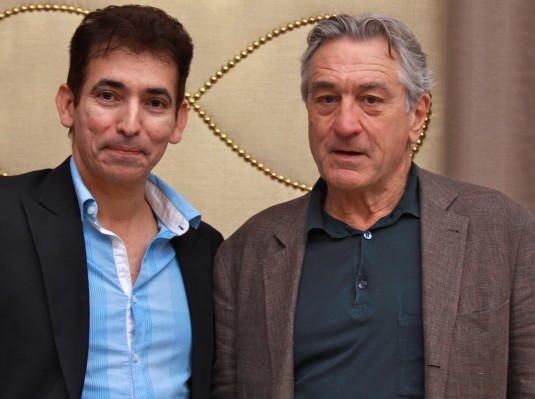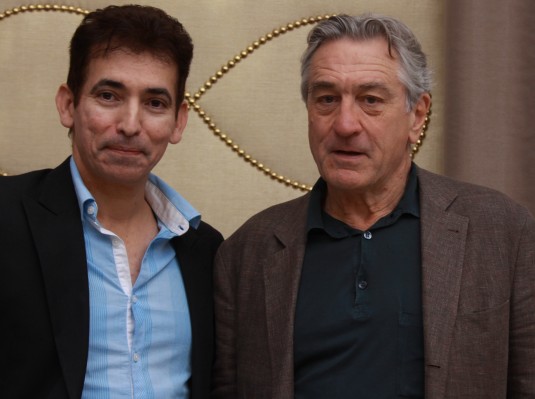
Robert De Niro is often regarded as the greatest actor of all time. His ability to utterly transform himself into a wide spectrum of characters such as a troubled loner in Taxi Driver, or a failing boxing champion in Raging Bull, or a cold-hearted mobster in The Godfather II and GoodFellas and a wild father in Silver Linings Playbook, has entranced audiences and critics alike, and garnered him three Oscars. Amazingly though, when I sit down to talk to him in Las Vegas, the city of his new movie Last Vegas, the prodigious talker on screen offers only one word or one sentence answers to my questions. Sometimes the answers were simply “Yes,” “No” or “I really don’t know.” And sometimes he only stares at me as if he is about to blurt his infamous line from Taxi Driver: “Are you talking to me?”
Like many other interviewers, I, imbued with false confidence, thought that I could crack the enigmatic legendary actor, but I ended up achieving nothing more than the occasional dry smiles and grimaces of discomfort. Unlike his peers, who love gushing about their mastery of their craft and their privileged existence, De Niro seems reluctant to share neither his life nor his thoughts with the world, insisting that he has nothing to say. Frankly, he may have a point, because after all artists communicate their thoughts and feelings via their art, and that’s exactly what he has done over 40 years of an illustrious career of artistic creativity.
Born in 1943 in New York City to an Italian father and an Irish mother, De Niro wanted to be an actor from the age of 10, when he played the Cowardly Lion in a school production of The Wizard of Oz, which helped him overcoming his shyness. At the age of 16, he dropped out of high school to pursue acting. “Nobody encouraged me,” he muses. “When I started out, it was one way; I wanted to be an actor. But when I got more into it, I just got into it. I can’t explain it in some ways.” Though he admits that working with director Elia Kazan on The Last Tycoon made a powerful impact on him and his career. “I must say that everything I heard about him was true. He was a great director, and I was lucky to have that experience with him.”
“Could you elaborate,” I ask.
“No. I don’t want to talk about it.” he blurted.
De Niro also went to the movies and observed the performances of his acting icons: Marlon Brando, Montgomery Clift, Barbara Harris and Greta Garbo. “I was impressed by what they did because they were actors who had some feeling that came from them that you can’t even explain, that other actors didn’t have,” he explains. But the superstar denies attempting to imitate them. “To see anybody do terrific, great things, you can always just be inspired by how good they are. Whether you can do what they do is another story,” he nods his head.
De Niro’s first movie role was in 1963, at the age of 20, in Brian De Palma’s The Wedding Party, which not released until 1969. But he gained public attention when he played a small time crook Martin Scorsese’s Mean Streets (1973). His professional collaboration with Scorsese would subsequently yield an array of classics such as Taxi Driver (1976), New York, New York (1977), Raging Bull (1980), The King of Comedy (1983), Goodfellas (1990), Cape Fear (1991) and Casino (1995). For the last couple decades, however, Scorsese has found a new collaborator in a younger actor, Leonardo Dicaprio, a development that doesn’t seem to perturb the aging legend. “That’s normal,” he insists. “I mean I can’t play the parts that Leo plays. That’s the way it is. That’s good. Leo has great respect and love for Marty. It’s a very good relationship. And maybe we’ll do something together, the three of us.”
In the meantime, De Niro has shifted into comedy and has become known to the new generation, not as the menacing mobster, but as the funny family man from movies such as Meet the Parents franchise and Silver Linings Playbook. This year, he has embarked on a new comedic venture in Last Vegas with other acting legends: Michael Douglas, Morgan Freeman and Kevin Kline. The four retirees head to the Las Vegas to celebrate the bachelor night of Michael Douglas’s character, Billy, who is marrying a woman 30 years his junior.
“I liked the idea of working with Michael and Morgan and Kevin, and the director Jon Turteltaub,” he says. “It seemed like a nice thing to do.” The 70-year-old actor admits that the movie is actually The Hangover for guys of his age. In fact, they were shooting Hangover 3 and Last Vegas at the same time in sin city, and Turteltaub had suggested that characters cross between the two movies. De Niro thought it was a great idea and suggested to Bradley Cooper, the star of The Hangover and his co-star in Silver Linings. “Bradley was fine with it,” he suddenly beams. “I think the director,” he pauses momentarily. “I don’t know,” he dismisses, throwing his hand in the air.
In his upcoming movie, De Niro is back to playing the tough guy. He unites with Sylvester Stallone in Grudge Match to play an aging boxer being coaxed out of retirement 30 years after last fight for one final bout. It’s kind of Jake La Motta (from Raging Bull) is going against Rocky.
Wrapping up the interview, De Niro springs out of his seat and races out; the torture session is over. I personally found his reluctance to talk or inability to articulate his thoughts in such settings to be endearing and charming. It’s evident from his palpable discomfort that his recalcitrant attitude doesn’t stem from rudeness or disrespect, but merely from being compelled to do something that he doesn’t excel at. He is indeed a great performer on the screen, but a lame one in interviews.
Later I bump into him at the hotel’s foyer, where I witness him chatting away on his cellphone as he excitedly paces back and forth. The life and vibrancy that was drained from him during the interview seems to have returned in full vigor.
